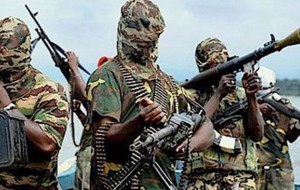According to the Nigerian military, they have agreed to a ceasefire with the  Islamic extremist group Boko Haram. As part of this agreement, the schoolgirls that the group abducted earlier in the year will be released. So far, Boko Haram has made no comment on the incident. This marks a significant breakthrough to 5 years of fighting, which has cost the lives of some 2,000 civilians this year alone.
Islamic extremist group Boko Haram. As part of this agreement, the schoolgirls that the group abducted earlier in the year will be released. So far, Boko Haram has made no comment on the incident. This marks a significant breakthrough to 5 years of fighting, which has cost the lives of some 2,000 civilians this year alone.
After a group of Christian schoolgirls were abducted by Boko Haram, it sparked international outrage, leading to a campaign to “bring back our girls”. So far, people are “cautiously optimistic” about the deal. According to the Nigerian government, the negotiations were sealed after a month of talks, mediated by Chad. As part of the agreement, Boko Haram has assured that they’ll release the girls they captured, which would be finalized at another meeting next week.
While Boko Haram would not be given territory under the ceasefire agreement, the government has yet to reveal what concessions it did make with the group. Nigerian officials hadn’t mentioned that they were undergoing negotiations with Boko Haram, making this an extremely surprising development. Many Nigerians are skeptical about the announcement, especially since there had been no definitive word from the Islamists. In the past, the army had been known to release statements about the conflict in northeast Nigeria which contradicted the actual situation.
Back in May 2013, Nigerian President Goodluck Jonathan imposed a state of emergency in northern Nigeria, vowing to crush the Islamist insurgency. The insurgents, who believe that Muslims are forbidden to take part in any political or social activity associated with Western society, have increased their attacks throughout the year. They frequently target schools and colleges, which they regard as a symbol of Western culture. Human Rights Watch reported that over 2,000 civilians were killed in the first half of the year, while Amnesty International estimated that 4,000 people were killed in the violence in the first seven months of the year.
Boko Haram is looking to develop an Islamist state in Nigeria, much like ISIS, but its fighters frequently cross into neighboring countries; the region where they operate borders Chad, Cameroon and Niger. Earlier today, eight Cameroonian soldiers and over 100 Boko Haram militants were killed fighting in the far north of Cameroon. Due to the threat that the militants pose to the security of the region, Nigeria, Chad and Niger agreed to form a 2,800-strong regional force to tackle them back in July.
